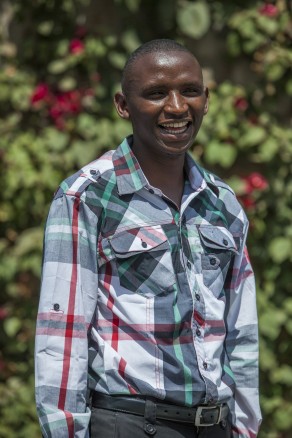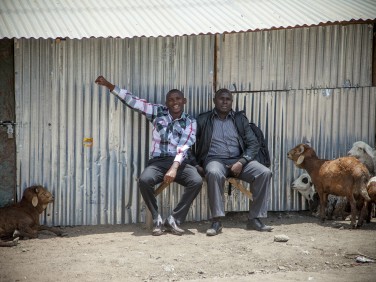
Chris, training slum dwellers in business
Local hero
Like many of his colleagues at Hand in Hand, Chris studied co-operative management. Two years into his job and responsible for coaching around 400 Hand in Hand group members, he clearly enjoys it: “Working with the community is the best thing I have ever done.”
 A former Scout leader, he has always volunteered in community projects and was keen to continue with social work. “I meet different people – some are rude, some are good, some are kind. I feel that now I can speak to anyone and make a difference.” The most challenging part of his work? “I am out in every weather, visiting up to four groups a day and following up with individuals, in the heat, the cold or the rain.”
A former Scout leader, he has always volunteered in community projects and was keen to continue with social work. “I meet different people – some are rude, some are good, some are kind. I feel that now I can speak to anyone and make a difference.” The most challenging part of his work? “I am out in every weather, visiting up to four groups a day and following up with individuals, in the heat, the cold or the rain.”
Some people are harder to train in financial literacy and business skills than others. “I have some clients who may not even have been to primary school. At first they only know about waking up, looking for food for the day, and that’s their life, so it can be difficult to get through to them.”
But in most cases, he feels he is making a tangible difference. “I was able to teach the groups about financial discipline. They may know how to use numbers, but not how to figure out how much they can afford. They are so used to just thinking about making enough to eat that day. Now they understand the point of having at least a small reserve for an emergency,” says Chris.
‘A good teacher’
Irene Wanjiku, one of Chris’s trainees, says about him: “I had a business before but it was Chris who advised us to move away from our old shop because the rent was just too high. And he was right, in the new shop we will pay so much less rent. He is a good teacher. ” Thanks to Chris’s intervention, Irene’s monthly income will increase from 5,500 to 9,000 Kenyan Shillings (around US $105) a month.
“Working with the community is the best thing I have ever done”

Chris has found working with Irene and her group really inspiring: “The moment I met them, I admired how they survive. They taught me that by being a hard worker you can do anything. They don’t have an education, they don’t have a job, yet they are very creative, they have ideas for a business, they believe they can make it. It’s all about determination – they know what they want. People around them might do drugs, or give up.
“The moment I feel like giving up, I think of them. If they are making it, then who am I to give up? It really motivates me.”
Next case study: Meet Gloria, the former refugee growing crops – and profits
